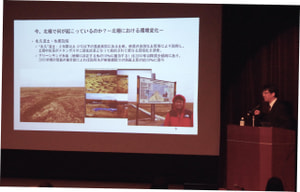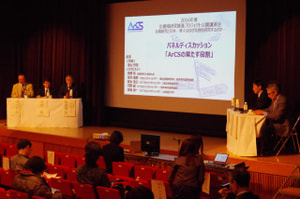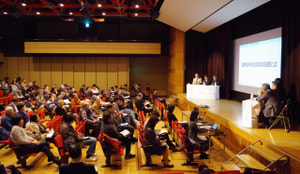Arctic Challenge for Sustainability project (ArCS) held a public lecture on Saturday, 18th March 2017 at Seiryo-kaikan Hall, Nagatacho. There were 158 audiences including scientists, company workers and students.
The lecture started with an introductory talk by Dr. Masao Fukasawa (Project Director of ArCS, NIPR/JAMSTEC), followed by the greeting from Mr. Toshiei Mizuochi (State Minister of Education, Culture, Sports, Science and Technology). Then, Ms. Kazuko Shiraishi (Japan's Ambassador in charge of Arctic Affairs) gave a talk with her expectation for ArCS as well as the lecture from the standpoint serving as an intermediary between Japan and other countries as well as researchers and policymakers.
Dr. Atsushi Sunami (Vice President at National Graduate Institute for Policy Studies) gave a keynote speech titled “Japan’s science and technology diplomacy supported by Arctic research - towards ‘science for humanity’ -.” In this speech, absorbing topics were presented from two points of view; science and technology for diplomacy, diplomacy for science and technology, such as how the Arctic is regarded in science and technology diplomacy and what contribution Japan is expected to make.
After Dr. Hiroyuki Enomoto (Sub Project Director of ArCS, NIPR) introduced the purpose and recent activities of the project, three presentations on individual research theme followed. Dr. Jinro Ukita (Niigata University) explained relationship between Arctic warming and Japan’s weather, while introducing recent weather and climate events in Japan. Dr. Makoto Koike (The University of Tokyo) presented the impact to Arctic warming caused by black carbon, which is formed through the incomplete combustion of fossil fuels, biomass, etc. The process how black carbon affects Arctic climate was also introduced with the latest observation data. Dr. Jun Inoue (NIPR) explained that observation data collected in Arctic improve the accuracy of weather forecasts for the middle latitudes, including Japan, and Japan is expected to contribute in constructing observing network in Arctic.
Following the above presentations, we had a panel discussion “Our role to fulfill” participated by Dr. Sunami and the Project Director and Sub Project Directors of ArCS. There were discussions on several topics such as; environmental preservation rules that should be required as it is being revealed that Arctic change has impacts on the global environment, and the importance of data in establishing such rules; the necessity of international frameworks for research in the Arctic region, most of which is under the jurisdiction of the Arctic coastal states; the advantage and contribution of Japan expected to be made regarding such rules or frameworks; and so on. Those discussions were suitably made by ArCS which is the project covering both natural science and social/human science.
Audiences also showed positive attitude by putting questions to the presenters. The lecture should be an opportunity to remind us of the importance of enhancing linkage between research and society, which is one of the ArCS’s aims.
Secretariat







